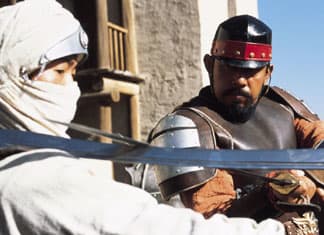Warriors of Heaven and Earth is Chinese filmmaker He Ping's (Red Firecracker, Green Firecracker, 1994) dubious contribution to the increasingly stale genre of stylish martial arts films. While Zhang Yimou's Hero and its predecessor, Ang Lee's Crouching Tiger, Hidden Dragon, may come to mind as comparative examples, the latter neither aspired for nor fulfilled B-grade status. However, He Ping's kitschy "folktale" is packed with classic tropes in an "Indiana Jones meets Wong Kar Wai" melee.
Set during the seventh century with the Tang Dynasty in power, the tale is laid out by narrator Wen Zhu, who is to be safely escorted back to the emperor by a remarkable swordsman and soldier, Lai Xi (Kanai Kiichi). Appropriately, Lai Xi left his native Japan to acquire his skills in China and his last mission requires that he kill Lieutenant Li, Lai Xi's equal in both swordsmanship and commitment to moral duty, who has erred in the emperor's eyes. Li has been assigned with guarding and assuring that a young Buddhist monk and his precious cargo of manuscripts and an unidentified "relic" are safely taken to the capital. Despite his renegade ways, he remains loyal to fulfilling this final mission.
As all good movie clichés go, Lai and Li bound by duty to fight to the death at the capital bond in solidarity to protect the cargo and the monk on this final journey. Of course, their adversary is an ambiguously evil warlord (played with wondrous exaggeration by Wang Xueqi), who sets his troop of bandits upon the tiny yet fearless crew of rag-tag soldiers led by Li and Lai.
Set primarily in the Gobi desert, reviewers have noted the film's attempt at straddling both the spaghetti western and martial arts genre. He Ping's film manages to do neither with glorious aplomb, but is helped along by the exotic and generically "eastern" score provided by none other than Bollywood favorite A.R. Rahman. The icing on the cake is the bizarrely second-rate special effects (Buddha energy, no less!) at the film's denouement. Had it been a little worse, the film could have successfully made the ranks of "so bad it's good kitsch." But alas, the warriors in this film are neither in heaven, nor on earth. It's purgatory all the way. (Mongrel Media)
Set during the seventh century with the Tang Dynasty in power, the tale is laid out by narrator Wen Zhu, who is to be safely escorted back to the emperor by a remarkable swordsman and soldier, Lai Xi (Kanai Kiichi). Appropriately, Lai Xi left his native Japan to acquire his skills in China and his last mission requires that he kill Lieutenant Li, Lai Xi's equal in both swordsmanship and commitment to moral duty, who has erred in the emperor's eyes. Li has been assigned with guarding and assuring that a young Buddhist monk and his precious cargo of manuscripts and an unidentified "relic" are safely taken to the capital. Despite his renegade ways, he remains loyal to fulfilling this final mission.
As all good movie clichés go, Lai and Li bound by duty to fight to the death at the capital bond in solidarity to protect the cargo and the monk on this final journey. Of course, their adversary is an ambiguously evil warlord (played with wondrous exaggeration by Wang Xueqi), who sets his troop of bandits upon the tiny yet fearless crew of rag-tag soldiers led by Li and Lai.
Set primarily in the Gobi desert, reviewers have noted the film's attempt at straddling both the spaghetti western and martial arts genre. He Ping's film manages to do neither with glorious aplomb, but is helped along by the exotic and generically "eastern" score provided by none other than Bollywood favorite A.R. Rahman. The icing on the cake is the bizarrely second-rate special effects (Buddha energy, no less!) at the film's denouement. Had it been a little worse, the film could have successfully made the ranks of "so bad it's good kitsch." But alas, the warriors in this film are neither in heaven, nor on earth. It's purgatory all the way. (Mongrel Media)
